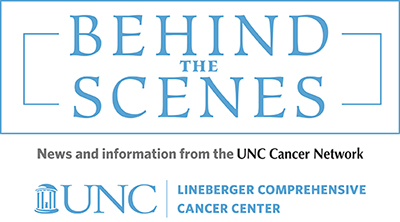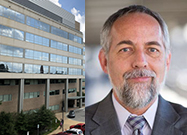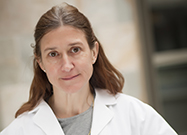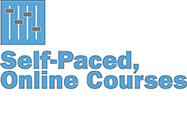Behind the Scenes — May 2019


From the Telehealth Director
Dear UNC Cancer Network Community Members,
The UNC Cancer Network Telehealth Team is always on the lookout for new and better ways to comply with our mission (see www.unccn.org/mission for details). I am pleased to say that we have found one more way to do just that!
Beginning this month, we will begin using IBM Watson’s artificial intelligence (AI) to provide automated closed captioning for out telehealth lectures. Watson allows UNCCN to provide reasonably accurate and extremely affordable closed captions for our recorded presentation. While we already offer closed captioning on the lectures in our Community College series, IBM Watson will provide an automated mechanism that we can use affordably, in conjunction with Mediasite capture service, to caption all lectures in our UNCCN Lecture Library (www.unccn.org/lecturelibrary).
Lectures which have closed captions display a circle containing “CC” (seen below the actual video) which may be clicked for closed captions. This captioning is displayed as the presenter speaks. All captioning also becomes part of our library search database, making every word in our lectures completely searchable. If you wish to request closed captioning for a past lecture, please reach out to our team at unccn@unc.edu. For more details on IBM Watson captioning services, please see: https://www.ibm.com/watson/media/watson-captioning/.
As always, thank you for your participation and support in our ongoing efforts to reduce the impact of cancer across the state of North Carolina.
All the best,
Tim.
![]()


Figure 1

Figure 2
Dr. Frances Collichio, Tar Heel, Coach, and Team Player
by Frances Collichio, MD
I am “a Tar Heel.” Those of you who have attended sporting events at The University of North Carolina, Chapel Hill (UNC) have likely seen athletes and coaches saying the same thing on large screens during breaks in the action. You may have also heard the expression that the “Ceiling is the Roof” and wondered what all of that means. I think it means that a “Tar Heel” is someone who has had the opportunity to dwell in this great university, learning from the talented people around us, and that the “ceiling is the roof” means to keep striving to be better.
I am a cancer doctor who sees patients, teaches, does research and hopefully, moves the game forward. The UNC Hematology Oncology Fellowship program, trains graduates from internal medicine to be experts in the fields of hematology (blood disorders) and oncology (cancer). Dr. Alice Ma is the overall program director, and I am the Associate Program Director in charge of clinical work. A fellowship program is a training program that takes place after doctors complete their residency. You can think of my role here as an “assistant coach.” We have remarkable fellows who are advancing research and outstanding, compassionate clinical care.
When Dr Paul Godley, was the fellowship program director, he called and emailed leaders at the American Society of Clinical Oncology (ASCO) to let them know that I was interested in writing a test for fellows. In 2008 I became part of the committee that started the ASCO In-Training examination. Fellows in the USA and other countries take this test once a year. Fellows use the results to see how much they have learned, and programs use the results to see how well they are doing with their training. I am no longer on the committee but, with some of my colleagues at other universities, we are continuing to analyze the process of this test and see how it improves our training programs.
Good doctors are more than just people who know a lot. The Accreditation Council of Graduate Medical Education (ACGME) is the organization that governs training for all doctors after they complete medical school. There are many things that the ACGME does to make the work of learning and practicing medicine by these graduates to be the best that it can possibly be. One assessment tool, “Milestones” shows the skills that the trainees are achieving along a continuum. I am on the ACGME committee that is making a “Milestones” specific for hematology and oncology. My goal is that this work will help fellows achieve their full potential in the specialty.
By now, you are probably surprised that so much goes into training doctors. You are probably so much more familiar with the doctoring part of what we do. For that, the next team I am a part of is the melanoma team. Melanoma, a very serious skin cancer, has gone through the greatest transformation of any cancer. When I joined this team in 2003, patients with advanced melanoma had a dismal prognosis. We worked hard from the early 2000s to 2015 to seek new treatments. The FDA approved many drugs after 2010. Agents that use the patient’s own immune system to fight cancer, called immune therapy, have revolutionized care not just for melanoma patients but for many cancers. Our melanoma team continues to advance cancer research and help determine which treatments are the right treatment, for the right patient, at the right time.
One of the treatments we did early clinical research on, Talimogene Laheparepvec (TVEC), comes from the herpes simplex virus, the virus that causes cold sores. TVEC was made so that it infects only the cancer cells and not the healthy cells, and it includes a gene for GM-CSF, a growth factor that increases the white blood cells thereby improving the patient’s immune system. It is administered as an injection right into the cancerous tumors. This outpatient treatment is administered every 2 weeks (Figure1) for approximately 6 months. Fifty percent of patients who have “in transit” melanoma, melanoma that is spreading locally on the surface of a portion of the body, will have a long lasting clinically meaningful result from this medication (Figure 2) and a substantial number of these patients remain in remission for many years.
There are many more “teams” at UNC that I have been involved in or continue to be a player, but one that deserves the final comment, is the Schwartz Rounds Committee. For nearly 15 years, Dr. Theresa Raphael Grimm and I have lead UNC’s Schwartz Center Rounds®. This conference uses a case-based format to go over the nonmedical aspects of patient care, such as teamwork and communication. Our committee members work hard to select a case and present a conference which, I hope, is one of the reasons that UNC is a world-class health care provider.
I am starting to look back at my long career and thinking about what the next several years will bring. As an oncologist, you learn to appreciate every day. And, when you get older, this appreciation becomes more palpable. My goal is not only to help my patients and their families see joy and hope, but also to help my teammates, medical students, residents and fellows see the joy in the profession of medicine. These are stressful times, but they can be amazing when one appreciates how fortunate we are to be working in cancer and especially to be working at UNC, among one of the best cancer centers in the world.
![]()

Upcoming Live Events
Marc Bjurlin, DO, MSc, FACOS
Meredith Crabtree, FNP-C
Prostate Cancer Screening
https://unclineberger.org/unclcn/professional-education/calendars/telehealth-lectures/
The most common non-skin cancer among men in the U.S., prostate cancer can be difficult to catch early. With this lecture, we will talk about screening methods, such as MRI and MRI- ultrasound targeted fusion biopsy as a risk stratification tool for men at risk for prostate cancer. For men who undergo radiation treatment, we will also touch on which ones might consider utilizing hydrogel. We will also discuss the nurse’s role in prostate cancer screening and care.
Trevor Hackman, MD, FACS
The Role and Importance of HPV Infection in Head and Neck Cancer
https://unclineberger.org/unclcn/professional-education/calendars/telehealth-lectures/
Dr. Trevor Hackman is the Director of the Head and Neck Oncology Fellowship and specializes in treatment of patients with diseases and disorders of the ear, nose, throat (ENT), with a focus in head and neck oncology. In this lecture, he will talk about the Human Papillomavirus (HPV) in head and neck cancers in terms of epidemiology, vaccination, molecular/genomics, de-escalation, role of TORS, and immunotherapy.
![]()

Recent Additions to the Learning Portal
Zev Nakamura, MD
Cancer-Related Cognitive Impairment: More Than a Side Effect of Chemotherapy
https://learn.unccn.org/online-course-catalog/rn-and-allied-health-courses/
Cancer can impair a patient’s ability to think and to remember. While this condition is often called ‘chemo-brain,’ cognitive impairment stemming from how cancer affects patients who might not have had either chemotherapy or radiation therapy. Dr. Nakamura will review our latest understandings of this condition.
Stephan Moll, MD
Anne W. Beaven, MD
Key 2018/2019 Developments in Lymphoma and Thrombosis/Anticoagulation
https://learn.unccn.org/online-course-catalog/medical-and-surgical-oncology-courses/
Each year, the American Society of Hematology (ASH) hosts a conference highlighting some of the latest hematologic oncology research. Join us as our speakers highlight some of the top presentations on Non-Malignant Hematology and Lymphoma from this year’s ASH conference.
Yuliya Pylayeva-Gupta, PhD
Immunological Mechanisms in Pancreatic Cancer
https://learn.unccn.org/online-course-catalog/medical-and-surgical-oncology-courses/
This lecture will review the current understanding of the role of immune system in pancreatic cancer and provide insight into development of the latest immune-based therapies aimed at treating patients with pancreatic cancer.
![]()
Learn more about the continuing education and other outreach efforts of the UNC Cancer Network. Many of the outreach programs that are part of the UNC Cancer Network are funded through the University Cancer Research Fund. Find out what UNCCN is doing by following us on Twitter at @unc_cn, join us on Facebook at www.facebook.com/unccn, unccn.org, or email us at unccn@unc.edu
We have signed you up for our newsletter with the hope that you will find value in its content. If this was forwarded to you by a colleague or friend, and you want to be added to our distribution list, please send us an email at unccnoperations@unc.edu.
Editor: Mary King, meking@email.unc.edu
Contributors: Dr. Thomas C. Shea; Tim Poe, Telehealth Director: Jon Powell, PhD, Continuing Education Specialist: and Veneranda Obure, AV Support Engineer.
Copyright © 2019 UNC School of Medicine Office of Information Systems, All rights reserved.